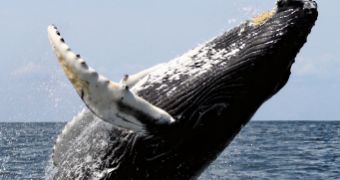A team of researchers writing in today's issue of the journal Science say that humpback whales and humans have one very interesting thing in common.
Long story short, it appears that both species are in the habit of passing on good ideas to others, meaning that both whales and people benefit greatly simply by learning from one another.
While humans might also pass on ideas having to do with abstract notions, humpback whales are a tad more pragmatic. Thus, the researchers say that they mostly pass on hunting techniques. EurekAlert informs us that the researchers now saying that these marine mammals rely on so-called cultural transmission in order to ensure the survival of their species base their claims on data collected by several other specialists while observing the behavior of humpback whales living off the coast of New England, US.
Apparently, it was back in the 1980s when these whales found that their favorite food (i.e. herring) was growing scarce.
This compelled the animals to look for other sources of nutrients, and consequently develop new hunting techniques. One of these involved their hitting the water with the help of their tail.
The same source informs us that, by the year 2007, 40% of the humpback whale population was very much familiar with this new hunting technique.
According to the researchers, this is proof enough that these marine mammals do pass on ideas by means of cultural transmission.
Here is what Dr. Luke Rendell, lecturer in the School of Biology at the University of St. Andrews, had to say with respect to this behavioral patterns of the humpback whales:
“Our study really shows how vital cultural transmission is in humpback populations – not only do they learn their famous songs from each other, they also learn feeding techniques that allow them to buffer the effects of changing ecology.”
The findings of this investigation are believed to back up previous claims that marine mammals such as dolphins and whales are not without cultural capacities.

 14 DAY TRIAL //
14 DAY TRIAL //